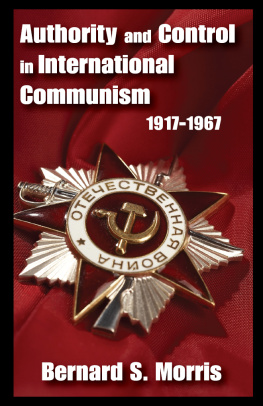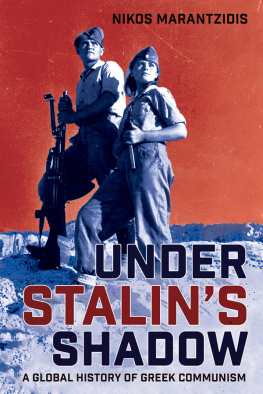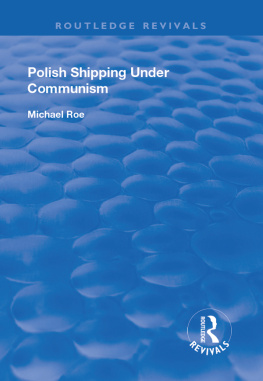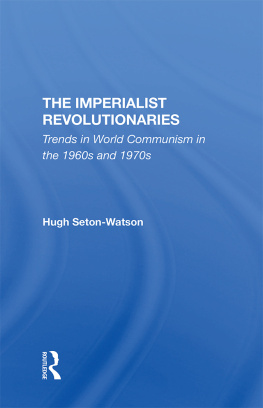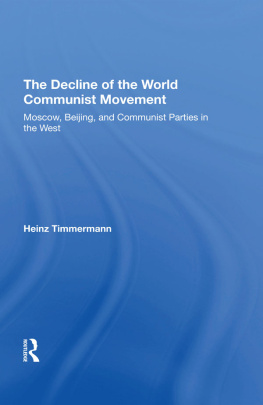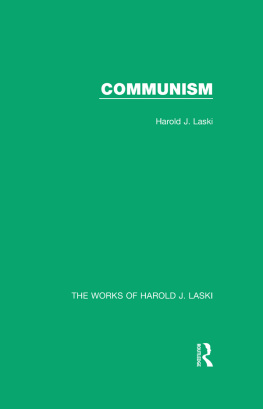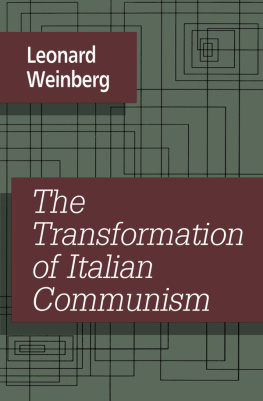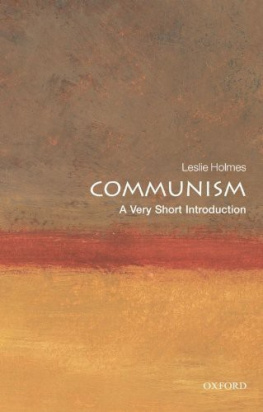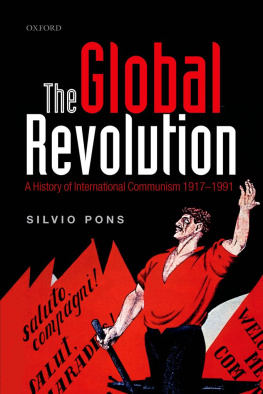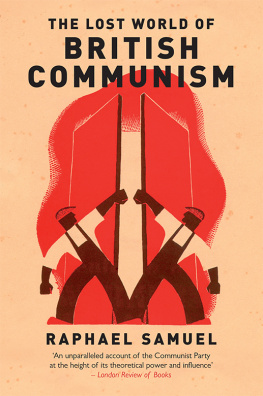Authority and Control in International Communism
Authority and Control in International Communism
1917-1967
Bernard S. Morris
First published 1966 by Transaction Publishers
Published 2017 by Routledge
2 Park Square, Milton Park, Abingdon, Oxon OX14 4RN
711 Third Avenue, New York, NY 10017, USA
Routledge is an imprint of the Taylor & Francis Group, an informa business
Copyright 1966 by Atherton Press
All rights reserved. No part of this book may be reprinted or reproduced or utilised in any form or by any electronic, mechanical, or other means, now known or hereafter invented, including photocopying and recording, or in any information storage or retrieval system, without permission in writing from the publishers.
Notice:
Product or corporate names may be trademarks or registered trademarks, and are used only for identification and explanation without intent to infringe.
Library of Congress Catalog Number: 2011023604
Library of Congress Cataloging-in-Publication Data
Morris, Bernard S.
[International communism and American policy]
Authority and control in international communism, 1917-1967 / Bernard S. Morris.
p. cm.
Previously published under title: International communism and American policy. New York : Atherton Press, 1966.
ISBN 978-1-4128-4567-0
1. Communism. 2. Communist International. 3. Communist parties. 4. United States--Foreign relations--Soviet Union. 5. Soviet Union--Foreign relations--United States. I. Title.
HX44.M569 2012
324.2175--dc23
2011023604
ISBN 13: 978-1-4128-4593-9 (pbk)
ISBN 13: 978-1-4128-4567-0 (hbk)
To BETTY, TONY and SAMMY, who cheerfully followed me into the wilderness
This volume represents an attempt to place in perspective the schism in the international communist movement and in some measure to relate American policy to this historic world event. Justification for yet another book on communism rests on the impression that while the Sino-Soviet dispute has been expertly chronicled and analyzed, relatively little has been written to place the schism in historical and institutional perspective or to examine the United States position in critical terms. Part I presents a schema of the changes that have occurred in the structure of authority and control of the communist movement over the decades and, hopefully, suggests some of the factors affecting both its unity and its polycentric drift. Part II deals with the American reception of the split in international communism and of Khrushchevs policy of accommodation with the United States, which figured as a major factor in the Soviet-Chinese split.
Whatever advantages this essay form affords the author in presenting his ideas in relatively brief compass, it admittedly suffers in failing to do justice to the complexities of the subject matter. In focusing, for example, on the psychopolitical reasons behind the cohesion of the international movement rather than on the overworked aspect of Moscows domination of itthat is, on a rigid control model in which virtual omnipotence is attributed to the ruling liteI have neglected a precise analysis of the changing motives of those who have moved into and out of the communist parties for more than four decades and of the very consequences of organizational manipulation and machine politics on the international structure. Similarly, I have tried to demonstrate that the development of international communism has been conditioned by American attitudes and foreign policy, but I have not, for example, detailed American political intervention in the affairs of certain countriesmany of them friendlyto subvert the communist parties. Much of the crucial evidence needed to do justice to this aspect of American/communist affairs is unavailable. In the same way, the unavailability of the Comintern archives prevents a definitive portrayal of the stresses and strains in international communism. The role of authority in the international communist movement as well as the interrelationship of American policy and communism remain fertile fields for the investigator. If I have merely made some suggestive comment on these topics which is intelligible for the most part to the general reader as well as the specialist, I shall be satisfied.
It is my poignant duty to acknowledge my debt to Otto Kirchheimer who read the entire manuscript just before his death. The world has lost a fine scholar and I, a dear friend.
I am also indebted to Morris Watnick who criticized the first part of the manuscript; to Herbert Marcuse and Samuel L. Sharp without the benefit of whose friendship I would be far more ignorant about man and politics; and to my former colleagues in the Department of State, anonymous by tradition, from whose association I profited.
May I also express my appreciation to the librarians of the Hoover Institution and the Department of State for their courtesies; to the Ford Foundation for making two teaching-free summers available; and to Edward H. Buehrig for his quiet encouragement.
Finally, I am especially indebted to Mrs. Helen E. Buchholz, old friend and former colleague, for preparing the Index.
Though I hope that the afore-mentionedand otherssubscribe to all or some of my views, I alone am responsible for what is written.

In the public mind, international communism has been viewed as a cohesive, disciplined movement bound by a common ideology subject to the dictates of Moscow. The national communist parties and their subsidiary organizations were subordinated to the policy preferences of Moscow. In no major policy shift did the parties deviate from the requirements laid down by the Moscow center. Communist leaders and cadres were distinguished by their subservience and obsequiousness. Monolithic unity was the hallmark of international communism, a view proclaimed by the Communists themselves and accepted by the non-communist public at large. The behavior of the communist movement under Stalins rule gave ample support to this conception.
Paradoxically, however, the history of the communist movement may be written as a record of deviation and dissension. The Trotskyist opposition of the 1920s and 1930s, the Titoist defection of the 1940s, the Chinese schism in the late 1950s, and the defection in the 1960s of a number of communist parties and communist party factions from the Soviet orbit are the highlights of the centrifugal tendency in international communism. A significant but less dramatic aspect of this tendency is the record of individuals who have resigned, defected, and been expelled from the parties as a result of disaffection for policy or other reasons. The loss of membership after the conclusion of the Nazi-Soviet Pact was one of the more obvious cases of a pattern of turnover that has been endemic to the communist movement. In a sense, the vaunted unity of the movement was secured by constantly replacing the disaffected with candidates whose memories were shorter or for whom previous policy shifts were irrelevant. What effect this turnover of membership had on a particular partys potential for growth and influence is anotherand speculativequestion. The unity of the parties, therefore, does not presuppose the idea of a long-term and committed membership; indeed it may be argued that the unity of the parties was secured in spite of the fickleness of the rank and file. Unity represents rather the allegiance of the national parties to Moscow, more specifically the allegiance of the party leaderships. For the record is clear: until 1953, with the notable exception of Tito, Stalin was able to command the allegiance of the national leaderships, including the Chinese Communists, through all manner of policy shifts. Where the leadership posed a problemor might have posed a problemStalin was able to secure substitutes.

